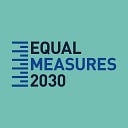Meet the team: Q&A with EM2030’s new Regional Coordinator for Latin America and the Caribbean

Cecilia García Ruiz is Equal Measures 2030’s (EM2030) new Regional Coordinator for Latin America and the Caribbean. Based in Mexico City, Cecilia will support EM2030 as well as our regional partner CLADEM (the Latin American and Caribbean Committee for the Defense of Women’s Rights) with regional technical project and influencing/advocacy support. Cecilia will also provide project and technical support to EM2030’s national partners based in Colombia and El Salvador.
Welcome to the EM2030 team, Cecilia! Can you please introduce yourself to the EM2030 community?
I am a passionate Mexican feminist with more than 10 years of professional experience working on gender equality issues. I have experience working in civil society, the public sector, academia, and as an independent consultant.
I hold a master’s degree in Public Policy and Gender and a bachelor’s degree in Psychology. My work as an activist and as a human rights advocate started in 2006 when I co-founded and led the Gender Program of Espolea, a youth-for-youth organization aimed at advancing the rights of young people in Mexico. Before joining EM2030, I held a position as the Rapporteur on the Rights of Women at the Human Rights Commission of Mexico City.
I have also served in various governing bodies. In 2012 I worked as a Social Advisor for the National Institute for Women in Mexico, in 2014 I served as the Acting Chair of the Adolescent and Youth Constituency for the Partnership for Maternal, Newborn & Child Health (PMNCH), and in 2017 I joined the Board of Directors of Women Deliver.
I am excited to be a part of EM2030’s unique partnership and to contribute the amazing work that they have been doing since 2016. I am confident that through our collective efforts, we will be able to tackle the challenges ahead and make sure that no girl or woman is left behind as we move forward to achieve the Sustainable Development Goals (SDGs) by 2030.
What inspired you to start working on gender equality issues in Latin America and the Caribbean?
My work as an activist progressively brought me closer to feminism — its principles, its theory and its practice — which has had an impact on me personally. These experiences sparked a process of self-discovery that helped me reaffirm my professional interests and my personal agency to contribute to improving the life of girls and women, first in Mexico, then in Latin America, and then the rest of the world.
I have found my inspiration in many people and places: as a university student during my lectures on gender and psychology, in political demonstrations where I felt energized by the hundreds of women around me, when sharing experiences and knowledge at global and regional conferences, and while learning about remarkable feminists of all ages and backgrounds.

From your perspective, what issues are the most pertinent to address if we are to achieve gender equality in Latin America and the Caribbean?
Latin America and the Caribbean is one of the most unequal regions in the world, which negatively impacts the rights of girls and women, particularly those living in marginalized contexts.
However, progress has been made in the last couple of years, for example when it comes to women’s political participation and their increasing roles in decision-making spaces at all levels. Also, progressive legal frameworks to advance women’s rights have been developed, and access to education for girls has improved.
Yet, violence against girls and women continues to be one of the main barriers to gender equality. Despite the numerous commitments countries have signed at the global level, femicides –the intentional killing of women based on their gender– have increased in Latin America and the Caribbean with high impunity rates, making it almost impossible for women to access justice.
Forced child pregnancies and motherhood is also urging feminists and gender advocates to demand for better policies to address gender inequalities, including access to friendly health services for girls, comprehensive sexuality education and access to safe and legal abortion.
Finally, Latin America and the Caribbean still has a long way to go to achieve equal pay and decent employment for women, in spaces free of violence and discrimination.

What are the objectives and aims of the Regional Coordinator role in Latin America and the Caribbean, and why is it important that EM2030 has this position in the region?
As the Regional Coordinator for Latin America and the Caribbean, I act as a bridge between EM2030 and its national partners in order to strengthen the capacity of girl’s and women’s movements in the region, develop and implement data-driven advocacy plans and amplify their messages and the reach of their work on gender equality. Other elements of my role include:
- Providing technical support to EM2030 national partners in Colombia and El Salvador.
- Acting as the focal point for EM2030’s regional partner and contribute to strengthening the knowledge and implementation of the SDGs.
- Represent and promote EM2030’s products in strategic regional spaces, including the SDG Gender Index, and contribute quality assurance, advice, analysis, and content to associated products, materials and tools.
This position is important to better understand the interconnections at the global, regional and local level, to contextualize the work of EM2030 in Latin America and the Caribbean, and to identify best practices and lessons learned that can be shared with EM2030’s Regional Coordinators in Africa and Asia.
What is needed by all stakeholders –Government, civil society organizations, feminist organizations– in order to achieve gender equality by 2030? How can data help achieve this?
Data helps to strengthen accountability across the development agenda and helps us to identify issues and areas where change is not happening fast enough. Data is a powerful tool to dismantle the counter-narratives against gender equality and different social movements, which continue to gain momentum around the world. Therefore, evidence-based advocacy has become more important than ever to achieve gender equality and the SDGs.
To accomplish this, stakeholders must harness the strength of their partnerships to protect the progress that has been made, and to resist the backlash sometimes seen against girls’ and women’s rights. Also, addressing the data gaps at the sub-national and local levels is fundamental to fully understand the impact of inequalities and discrimination against girls and women. Finally, sustained investments are needed to support advocacy efforts led by girl’s and women’s movements, especially at the grassroots level.
Learn more about the gender equality situation in Latin America and the Caribbean on the Gender Advocates Data Hub, here.










